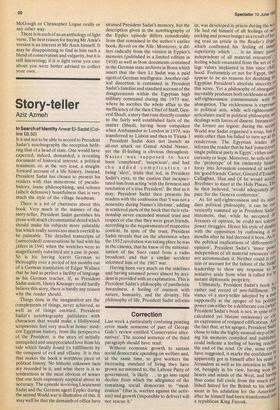Story-teller
Aziz Azmeh
In Search of Identity Anwar El-Sadat (Collins £6.50) It is sad not to be able to accord to President Sadat's autobiography the reception befitting that of a head of state. One would have expected, indeed, demanded, a revealing document of historical interest, a political testament, or, at the very least, a straightforward account of a life history. Instead, President Sadat has chosen to present his readers with that minestrone of pseudohistory, inane philosophising, and solemn (albeit defensive) boastfulness that is very much the style of the village headman.
There is a lot of chattiness about this book. Very much in the manner of the story-teller, President Sadat garnishes his prose with much circumstantial detail which should make his subjects more palatable but which really scores too much overkill to be palatable. The detailed transcripts of (unrecorded) conversations he had with his jailers in 1941 when the wretches were so magnificently outwitted are a case in point.
So is his having learnt German so thoroughly over a period of ten months out of a German translation of Edgar Wallace that he had as perfect a facility of language as his German teacher. If, as President Sadat asserts, Henry Kissinger could hardly believe this story, there is hardly any reason why the reader should.
Things done in the imagination are the complements of things, never achieved, as well as of things omitted. President Sadat's autobiography pullulates with characters that would make a Hollywood scriptwriter feel very much at home: mod ern Egyptian history, from the perspective of the President, is the story of initially unrequited and unappreciated love from his side which finally found is fulfillment by the conquest of evil and villainy. It is this that makes the book a worthless piece of political history. No hitherto unknown facts are recorded in it, and what there is is so tendentious in the most obvious of senses that one feels supremely sceptical about its accuracy. The episode involving Lieutenant Sadat and the German agent Eppler during the second World war is illustrative of this. It may well be that the demands of office have strained President Sadat's memory, but the description given in the autobiography of the Eppler episode differs considerably from that contained in the author's earlier
book, Revolt on the Nile. Moreover, it differs radically from the version in Eppler's
memoirs (published in a limited edition in 1958) as well as from documents contained in the German state archives in Bonn which assert that the then Lt Sadat was a paid agent of German intelligence. Another radical distortion is contained in President Sadat's familiar and standard account of the disagreements within the Egyptian high military command during the 1973 war, where he ascribes the whole affair to the inefficiency of the then Chief of Staff, General Shazli, a story that runs directly counter to the fairly well established facts of the matter (Shazli, having been outspoken when Ambassador to London in 1974, was transferred to Lisbon and then to Tirana.) President Sadat does not launch an all-out attack on Gamal Abdul Nasser, yet the ill-feeling is obvious throughout.
Nasser was supposed to have been 'complexed', 'suspicious', and had the added complication of being 'alert', traits that led, in President Sadat's eyes, to the caution that incapaci tated him from acting 'with the firmness and resolution of a true President'. Be that as it may, President Sadat then presents his readers with the confession that 'I was not a nonentity during Nasser's lifetime', adding in scattered parts of the book that their rela tionship never exceeded mutual trust and respect or else that they were great friends, according to the requirements of respective context. In spite of the trust, President Sadat reveals that on the afternoon when The 1952 revolution was taking place he was in the cinema, that he knew of the nationalisation of the Suez canal from a radio broadcast, and that a similar accident informed him of the 1967 war.
Having been very much on the sidelines and having assumed power almost by acci dent is provided with an explanation. This is President Sadat's philosophy of pantheistic inwardness, a feeling of oneness with nature, humanity, and the divinity. His philosophy of life, President Sadat informs


































 Previous page
Previous page